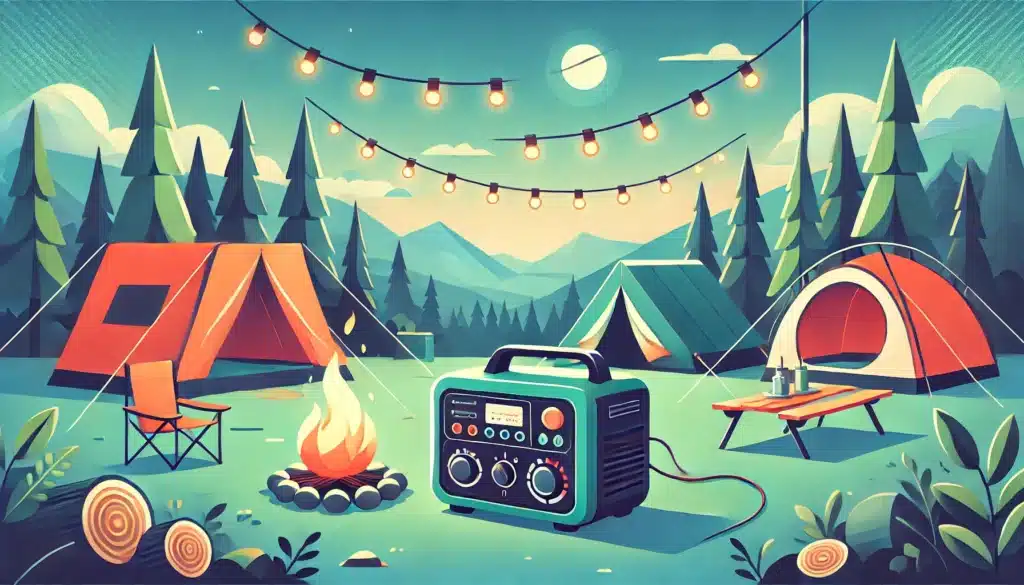If you’re out enjoying the great outdoors the power you have available can turn your camping experience to outstanding. The best portable generators for camping offer the ideal balance between the power, sound levels and fuel efficiency, and are light enough to be easily transported.
It doesn’t matter if you want to power vital devices, charge electronic devices or power small appliances, picking the best portable generator is vital for a comfortable camping experience.
In this complete guide, we’ve analyzed and reviewed the best 7 portable generators that you can buy at Amazon today.
We’ve assessed them based on power capacities and portability, as well as running time, noise level and overall quality to assist you in making a well-informed choice.
Our buying guide provides all you need to know prior to making a purchase. Let’s make the most of the next time you go out!
Table of Contents
Best portable generators for camping Recommendations
1. ERAYAK 4500W Tri-Fuel Portable Inverter Generator
The ERAYAK 4500W Tri-Fuel Portable Generator offers exceptional versatility and dependability for all your power requirements.
unique generator operates on propane, gasoline as well as natural gas offering an unbeatable flexibility during emergency situations outdoors, on outdoor adventures, or jobsites.
With 4500 peak watts of power and pure sine wave technology, it can safely power sensitive electronics as well as handling appliances that are in high demand.
The efficient inverter technology guarantees longer running times and lower use of fuel, and operates at 58dB which is less raucous than normal conversations.
Ideal for camping or home backup power or even construction tasks, the generator offers mobility with a powerful power output, ensuring you are always connected, wherever and whenever you require electricity.

Pros
- Tri-fuel capabilities offer the most flexibility and options for fuel in emergency situations
- Inverter technology that is clean and safe can power delicate electronics such as smartphones and laptops.
- Its remarkable silence (58dB) makes it perfect for residential and camping areas.
- The impressive 4500W peak output handle several appliances simultaneously
- The compact design has wheels and a handle for effortless transport despite its power
Cons
- Costs higher than alternatives to single-fuel
- It requires separate conversion kits for natural gas and propane use
- Larger in comparison to smaller-capacity generators (approximately 105 pounds)
2. Jackery Portable Power Station Explorer 300
Its Jackery Explorer 300 portable power station is a great option for power requirements that are off the grid.
With a lithium battery with 293Wh capacity, it’s packed into a compact light appearance (7.1 lbs) It’s ideal for camping trips, weekend getaways trips, or for emergency backup power.
The power station is versatile and comes with numerous output options, including AC outlets USB-C, USB, USB-A and an DC carport that allows users to power all kinds of devices from laptops to CPAP devices to smartphones and cameras.
Its quick-charging capabilities get you fully charged in no time regardless of whether you’re charging through a the car, wall outlet, or solar panels that are available which makes it a great partner for outdoor enthusiasts that require durable portable power that doesn’t carry the weight.

Pros
- Amazing 293Wh capacity in a compact and lightweight style (just 7.1 kilograms)
- Numerous input ports (2 AC 1, 1 USB-C USB-A 1 DC) to power various devices simultaneously
- Fast charging capability with multiple input options (wall car solar, car)
- Inverter that is pure sine wave to ensure charging sensitive electronics
- Quiet, zero-emission operation suitable for indoor and outdoor use
Cons
- Insufficient power to power appliances with high watts for prolonged time
- Solar panels for charging are available separately
Costs more than standard battery packs (though justifiable by the function)
3. BLUETTI Solar Generator AC180, 1,152Wh LiFePO4
The BLUETTI AC180 Solar Generator delivers reliable power whenever and wherever you require it the most. With its massive capacity of 1,152Wh LiFePO4 batteries capacity as well as an an impressive 1,800W
AC power output This portable power source provides excellent backup power for outdoor adventures, as well as living off grid. The long-lasting LiFePO4 battery technology guarantees longevity with more than 3,500 life-cycles, while its numerous charging options, including solar power–make it suitable for a variety of scenarios.
It is small enough to carry easily, yet strong enough to power important appliances The AC180 balances portability and performance and makes it a good option for those who require stable mobile power or an emergency backup in an uncertain world.

Pros
- A powerful 1,800W output is capable of handling the majority of household appliances, including small power tools and refrigerators.
- Long-lasting LiFePO4 battery chemistry provides greater cycle life and security in comparison to lithium-ion batteries
- Different charging options (AC solar and car) offer flexibility for a variety of use scenarios.
- A relatively compact and portable design, especially considering its power capabilities
- Fast charging is possible in wall sockets
Cons
- The price of premiums could be too high for consumers with a tight budget.
- At 61.9 pounds (28.1 kg) it’s lightweight but it’s still too heavy for many users to manage on their own.
- Solar charging requires a separate purchase of suitable panels for truly off-grid operation
4. The GRECELL 288Wh Solar Portable Power Station
energy when you need power when you need it the power when you require it. This powerhouse is compact and offers the 300W (600W maximum) output power in a compact, lightweight design that is ideal for those who love the outdoors remote workers and emergency preparation.
With multiple output ports, including AC outlets as well as USB outlets, as well as DC inputs it’s able to simultaneously power a variety of devices, from phones and laptops as well as small devices.
Its lithium-ion battery is an energy source that is quiet and clean with no odors or fumes which makes it perfect for road trips, camping trips, travel, or for home backup in the event of outages.
Equipped with solar-powered charging It provides complete off-grid capabilities for reliable power wherever your adventures take you. delivers reliable

Pros
- Flexible charging options, including solar support for truly off-grid use
- Many output ports (AC, USB, DC) to power a variety of devices simultaneously
- Lightweight and compact design with built-in handle to provide the ultimate mobility
- The operation is quiet and without fumes like gas generators.
- Built-in LED light is useful for emergency situations or camping
Cons
- 288Wh capacity is not able to accommodate appliances that use high-power for prolonged periods
- Solar panels are typically sold as a separate item and adds to the overall cost
- More time to recharge as compared to wall chargers that are standard. 288Wh Solar Portable Power Station 300W (Peak 600W)
5. Aceup Energy 4500 Watt Inverter Generator 223CC
This Aceup Energy 4500 Watt Inverter Generator provides steady power when you need it the most. With its strong 2-23CC powertrain, it offers reliable, clean power for everything from camping trips to backup power for your home during power outages.
Ideal for both homeowners and outdoor enthusiasts alike, it is able to balance powerful power output and low noise and energy efficiency.
Inverter technology provides the safety of charging sensitive electronic devices such as smartphones and laptops but still able to handle larger appliances effortlessly.
It is small enough for travel, but strong enough to be used for serious purposes This generator is an ideal middle-ground option for those who want reliable portable power with no industrial-grade volume or high levels of noise.

Pros
- Power output that is stable and clean secure for electronics with sensitive components
- The impressive 4500-watt capacity can handle multiple appliances at once
- More efficient in fuel use than traditional generators
- It is relatively quiet when compared with typical generators.
- Design with handles that are portable, and built-in to make it easier to transportation
Cons
- The inverter is heavier than the smaller models that are lighter, which could affect the portability
- The initial cost is more expensive than comparable non-inverter generators.
- Might require regular maintenance to ensure that the system is operating at its best.
6. EnginStar 300W Solar Generator with 60W Solar Panel
This EnginStar 300 Watt Solar Generator that comes with a 60W solar Panel is a compact and durable power source for outdoor enthusiasts as well as emergency readiness.
The portable solar power station provides clean, renewable power in times of off grid power or power interruptions. With numerous output ports, and a respectable 300W capacity, it’s designed to keep vital devices running, including smartphones and small appliances.
The 60W solar panel means you’ll be able to charge wherever the sun shines. This makes it perfect for RV trips, camping excursions or even as a home battery backup source.
Its light design and integrated carrying handle makes transporting it easy and the user-friendly display lets you check power levels in a single glance.

Pros
- Full solar system that includes panels and generators included
- Multiple output options (AC, DC, USB) for versatile device charging
- The operation is quiet and emissions-free as compared to gas generators.
- Rapid solar recharging capabilities with the 60W panel’s efficiency
- Portable and compact design, with a carry handle integrated
Cons
- 300W capacity limit use to appliances and smaller devices only.
- A single 60W panel can mean longer charging times under less-than-ideal conditions.
- Could not be enough to handle extended power outages with no additional panels
7. Pulsar PGD16ISCO Ultra Light Quiet 1600W
This Pulsar PGD16ISCO Ultra Light Quiet 1600W generator packs incredible power for portable use in a remarkably light package.
Ideal for camping and tailgating events as well as emergencies, this small generator delivers reliable output of 1600 watts with whisper-quiet operation.
The innovative design focuses on mobility without sacrificing performance which makes it a great choice for outdoor enthusiasts that require reliability without the hum and bulk of conventional generators.
With a fuel-efficient engine and easy-to-use controls, the PGD16ISCO offers comfort and peace of mind wherever you go.

Pros
- A remarkablely lightweight design makes transportation and storage a breeze
- A whisper-quiet operation with just 52 decibels will not disturb neighbors or campgrounds.
- A fuel-efficient engine offers extended duration that can exceed 10 hours with one tank
- The convenient push-button start button reduces the frustration of pulling cords
- Multiple outlets accommodate various devices simultaneously
Cons
- 1600W power may not be enough to power multiple appliances that are high-demand.
- Premium features are available at an increased price tag when compared to the basic generators
- It requires periodic maintenance to ensure the highest performance
How to Choose the Best Portable Generator for Camping: A Buyer’s Guide
Power Requirements
Before deciding on an outdoor generator that can be carried around make sure you know your power requirements by listing all the devices you’ll require powering simultaneously, and the wattage requirements for each. For essential needs such as charging phones lighting, running LEDs and small fans the 300-500W power unit or a 1000-2000W generator will be adequate.
For more demanding uses, such as coffee makers, electric coolers or air conditioners for RVs, search for models that offer 2000-4000W or higher.
Keep in mind that some appliances require more beginning (surge) power than running watts. This is especially true for ones with compressors or motors. Make sure you choose a generator that has at 20 percent greater capacity than your estimated requirements to give you a security buffer.
Generator Types: Inverter vs. Conventional Vs. Power Stations
Inverter Generators They produce pure electricity that is safe for sensitive electronics using a multi-step method that helps stabilize the current. They are typically quieter, less fuel-intensive and lighter than traditional generators, which makes them perfect for camping. But, they typically cost more per unit of power.
Traditional Generators They generate electricity straight from an alternator, without any additional processing. They usually provide more power for the money, but are more loud, heavier and generate electrical energy that could damage delicate electronic components. They’re more suitable for running basic appliances and tools rather than smartphones and laptops.
Portable Power Stations They are battery-powered units that store power and then deliver it with no noise or emissions.
They are ideal for camping in tents in which noise or fumes could be a problem, however they aren’t as powerful and have a shorter runtime in comparison to generators powered by fuel. Think about these generators for smaller requirements or in situations where traditional generators are not permitted.
Fuel Type and Runtime
Fuel: Most common fuel for camping generators. It is widely accessible, however it has a limited shelf time (3-6 months with stabiliser).
Propane It is cleaner burning and has unending shelf life, but typically, it is less powerful than gasoline, and requires the transport of propane tanks.
Dual Fuel It allows you to make use of propane or gasoline in accordance with availability and conditions.
Batteries: These power sources operate in silence, without emissions, but are limited in capacity and require recharge from a different source of power (wall outlet, automobile or even solar panels).
Take note of how long you’ll need to run your campervan. Most manufacturers provide runtimes at 25 percent load however the actual use of your equipment could require more power, resulting in shorter operational time.
Noise Level
The measurement of noise is in decibels (dBA) With every 10 points increase doubling the perceived level of loudness. To understand:
- 40-50 dBA: Silent conversation level, perfect for camping.
- 50-60 dBA is a normal conversation suitable for the majority of campgrounds
- More than 60 dBA Increases the volume of conversations above the conversational level and could be disruptive
A lot of campgrounds have noise limits that typically require generators to operate at least 60 to 65 decibels. Be sure to check the specific rules of your campground before deciding on the right generator. When camping with tents near other campsites choose models that are quieter (under 55 decibels) to ensure peace and harmony in the camp.
Portability and Size
Take into consideration both weight and physical dimensions when evaluating the feasibility of portability to be used for camping. The majority of camping-friendly generators weigh between:
- Ultra-portable power stations: 5-15 pounds
- Compact inverter generators: 40-50 pounds
- Midsize inverter generators: 50-80 pounds
- Larger open-frame generators: 80+ pounds
Choose models with strong handles or wheels (for larger models) or an equilibrating design that allows for easier transportation. Be aware that you’ll have to carry not only the generator, but as well fuel tanks for models powered by gas.
Conclusion
Be aware of your personal preferences for camping, your power needs and the typical camping spots when deciding which one to choose. If you’re seeking the highest power, quiet operation or ultralight portability there’s an ideal portable power source for your outdoor excursions. By choosing the ideal generator you’ll be able to enjoy the benefits of electricity and still be able to enjoy the nature surrounding you.




